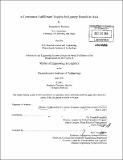e-Commerce fulfillment models for luxury brands in Asia
Author(s)
Thomson, Benjamin R; Hu, Hao
DownloadFull printable version (8.414Mb)
Alternative title
Electronic commerce fulfillment models for luxury brands in Asia
Other Contributors
Massachusetts Institute of Technology. Engineering Systems Division.
Advisor
Donald Rosenfield.
Terms of use
Metadata
Show full item recordAbstract
Asia-Pacific countries have experienced a rapid rise in Internet usage in recent history. China, in particular, has seen 40% of its population (or 500M people) connect to the Internet in the past 10 years, and continues to experience an increase in its user base. This large user base, coupled with a rise in wealthy households and per capita spending, is driving a dramatic increase in e-Commerce retail, specifically in the luxury goods space. Consumption of luxury goods in China has reached $9.4B in 2010, second only to Japan in the world. As luxury purchase rates continue to increase in China, luxury fashion brands are investing many resources to understand the customer, develop the market, establish the supply chain, and deliver the products. Polo Ralph Lauren (PRL), in order to continue its growth in China, is expanding aggressively through license reacquisitions and retail store developments. Furthermore, to provide its existing customers with additional products and enhanced services, and to capture consumers who live in cities without access to PRL's brick and mortar stores, PRL has set its vision to develop an e- Commerce business in China. This thesis provides a fundamental understanding of PRL's current business operations and of current e-Commerce fulfillment models for luxury apparel brands in China. An assessment of gaps was also conducted between current fulfillment operations of PRL and those of other luxury brands and 3PLs operating in China, specifically on delivery lead-time, last mile delivery options, end-to-end customer service, and return logistics. From this research, we recommend general methods for luxury brands to manage and provide best in class fulfillment service. For PRL, we specifically recommend the company maintain ownership of all customer-facing activities to ensure quality. We also advise PRL to integrate all customer information from retail to e-Commerce, further strengthening its service offering and brand image. Furthermore, we recommend PRL to locate and outsource its initial DC in Shanghai and partner with FedEx and EMS for fulfillment.
Description
Thesis (M. Eng. in Logistics)--Massachusetts Institute of Technology, Engineering Systems Division, 2011. Cataloged from PDF version of thesis. Includes bibliographical references (p. 85-87).
Date issued
2011Department
Massachusetts Institute of Technology. Engineering Systems DivisionPublisher
Massachusetts Institute of Technology
Keywords
Engineering Systems Division.